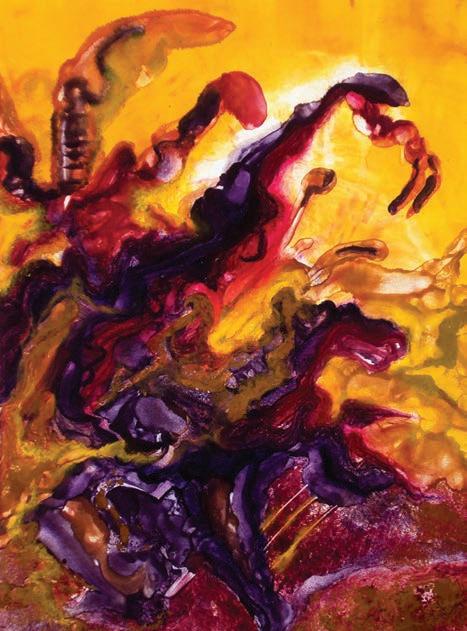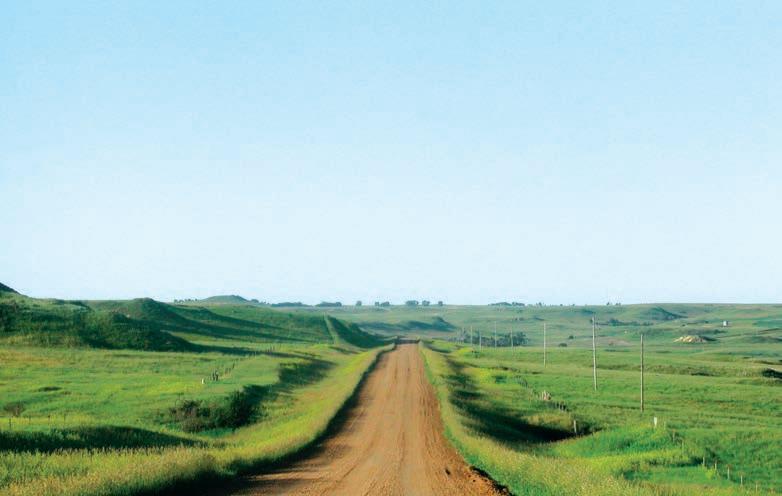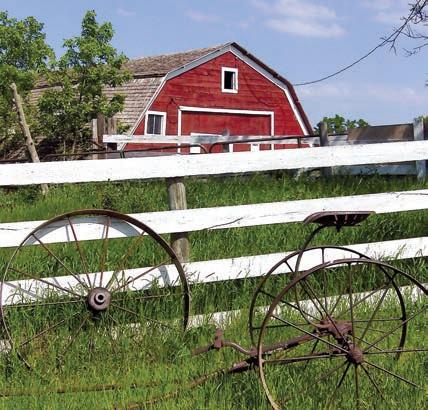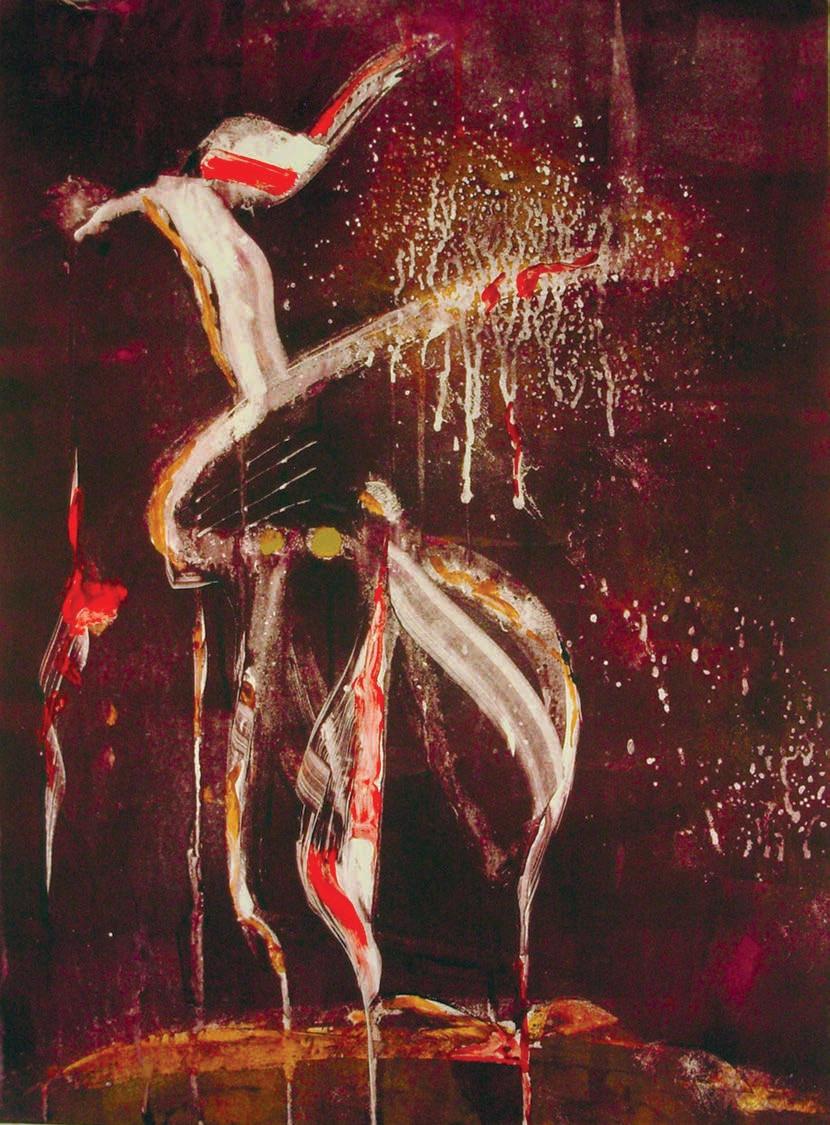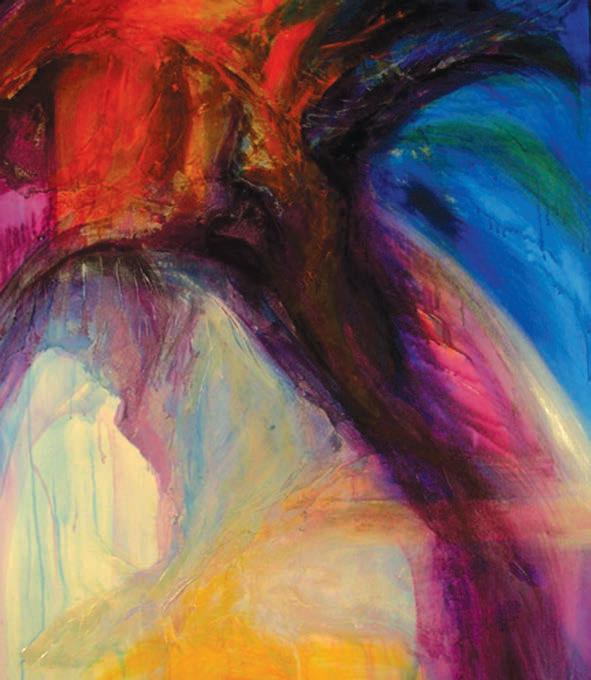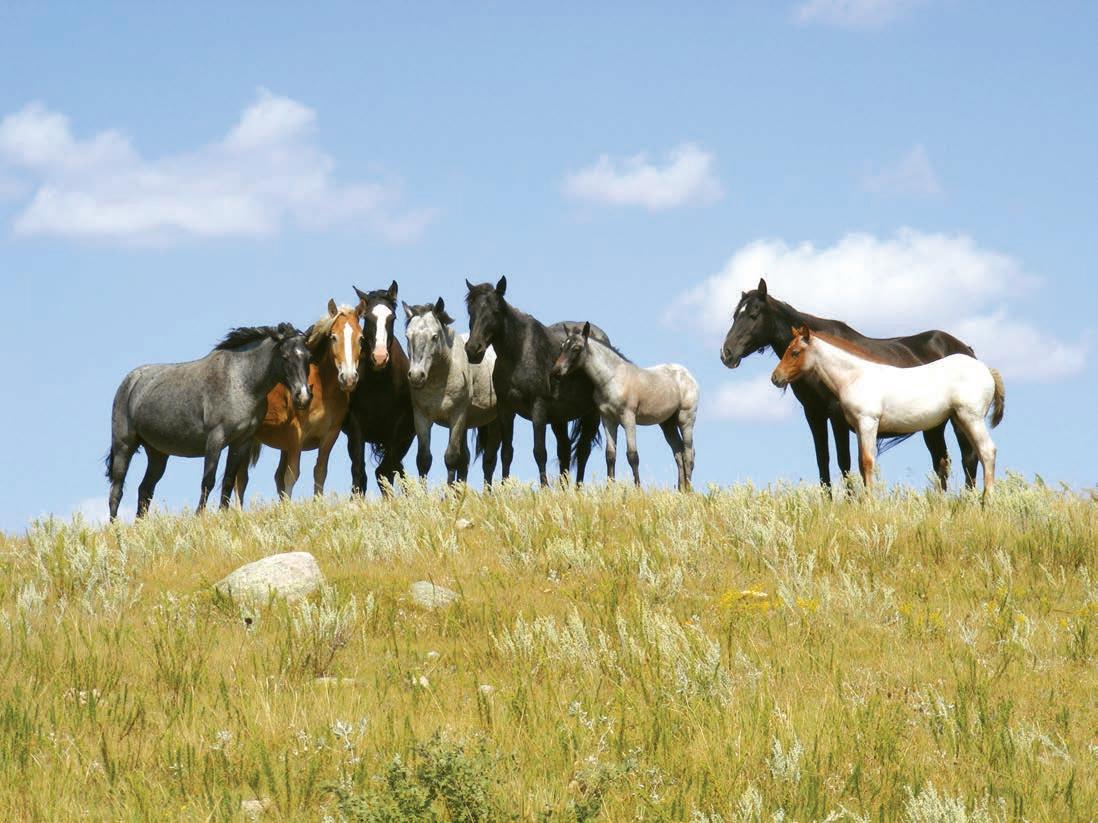
9 minute read
God is Merciful: The Neighbors, Not So Much
By Karen Herzog
“Elsewhere, the sky is the roof of the world. But here, the earth is the floor of the sky.” - Willa Cather
Advertisement
In the Coen brothers’ film Fargo, there is a moment of pinpoint accuracy that has stuck with me: when Steve Buscemi’s character ditches his stolen cash by burying it next to a fence line in a snow-driven landscape. Searching for a landmark to guide him back to it, he glances right and left. The fence goes into infinity in both directions, with not one other feature in the desolation around him. You can actually feel his hope die right there.
Dead funny and spot-on.
There’s also a cliché describing how people feel compared to the vastness of a starry sky: “Doesn’t it make you feel small?”
I’ve never heard anybody who grew up in North Dakota say it. Duh. We live our lives under the sky, day and night, and we feel our scale underneath it quite clearly. Why belabor the obvious?
Some call the prairie featureless, but it’s not. Red-winged blackbirds decorate the cattails. Rusting threshers sit sentinel on rises like husked locusts. Cattle idly switch flies off their backs in the summer. We have power lines and gravel roads and shelterbelts. Nothing to rival the sky, though.
North Dakotans understand that we have some control over the earth. We can plow it and plant it and hope to harvest it. But all that work, in the end, comes down to what comes down from above, from the immense downturned bowl we live beneath. Rain, hail, sun, wind, tornado, frost, blizzard. How natural then, that “beneath” has become one of our basic understandings of our place, in this place.
This landscape offers few places of concealment. You can’t really hide behind a barbed wire fence. Neglect of your crops or your livestock or your outbuildings will be revealed to anybody driving past. You can’t hide the evidence of your work habits, hence, your character, from the community. And, like poor Lydia Bennett in Pride and Prejudice, the good opinion of your neighbors, your credibility, your respectability, once lost, is gone for good. In small communities, redemption is available, but in limited quantities and only after death. God is merciful; the neighbors, not so much.
“Where there is bread, there is home.” – German- Russian proverb
All my great-grandparents were among those who immigrated to the Dakotas from crumbling czarist Russia, to claim some of the last free homesteading land still available. From their villages around the Black Sea, they had worked a unique pocket of another vast landscape, the Russian steppe.
For more than 100 years, those Germans, speaking their antique Swabian dialect, had held fiercely together in their little colonies, islands in the vastness of Eurasia and aliens to the sea of Russians surrounding them. Fearful of the forced assimilation they foresaw coming, they picked up and emigrated. To another place where they were again the outsiders, the minority, the newcomers, starting from scratch. They bought land from ‘the English’ who had preceded them to the Dakotas in the decades following the Civil War.

Threshing, 1937
What those Back Easterners found here was a climate of fierce extremes. They found that breaking sod was breaking them. They had other skills and they mostly left and took themselves elsewhere. But these German- speaking immigrants stuck. Plucking up the courage to leave their villages and vineyards and fields, cross half of Europe, the whole Atlantic and then another half-continent, had wrenched them to the core, left them hungry to burrow their roots down into the earth, something to hold them in place. In those first decades, it took everything they were—fertile, tough and prolific—to wrest a living, by brute force, from this treeless and semi-arid place.

Snow in 1943 nearly buried the garage on our grandmother’s farm
Even today, in North Dakota’s politics and culture, you can feel the after-echoes of our grandparents’ fear, as greenhorns, of being duped, cheated, taken advantage of. The wounded pride of feeling their way through another foreign culture, at feeling foolish, being ridiculed, of the stigma of the bumpkin, the peasant. Economically and politically, prairie people have felt both forgotten and exploited. Living in a small and sparsely populated state, with a culture emphasizing humility and obedience to authority, we are left feeling ourselves at the mercy of faceless forces, those who set gas prices and commodity prices. Buy high, sell low.

The author’s grandmother, Katherine Gebhardt Rempfer, and her sister-in-law, Fredrika Gebhardt, 1925

The author’s cousin, Paul Speidel, and his bottle lamb, 1926 All photos courtsey of Elizabeth Rempfer Fiechtner, courtesy of Mike Rempfer, Bismarck, ND
“A German will fall into work like another man into sin.” – from the book Plains Folk, by Father William Sherman
Wind, grasshoppers, drought, blizzard.
You can try to out-think them, out-plan them. Mostly, you can work, and drive those around you to work, until you drop, knowing all that labor can be extinguished in a ten-minute hailstorm. Farmers share the same dread, have the same knots in their stomachs. Here, that means short, broken sleep at calving time, pushing yourself from daylight past dark at harvest-time, racing against whatever the sky might deal out, outrun disaster, get the crop in, safe. Please, no sleet at calving. Please, no hail at harvest. Please rain. Please, but not today.
Small things can be disastrous. So no slacking. No goofing off, leaving the corral gate open; taking a day off from haying, only to have a thunderstorm flatten the field. Catching a hand in the power take-off; leaving a spark that ignites a haystack.
Carelessness is no minor vice. Taking risks is not just foolish, but can be deadly.
When people wonder why North Dakota doesn’t breed squadrons of risk-taking visionaries and daredevil entrepreneurs, we could wearily say that making a living from the land gives us all the risk we want, thank you.
The question outsiders ask most often is, “why don’t you leave?”
The answer is, lots of people have done so. Even some who loved it dearly have given it up. The 1930s took a big slice. The 1980s took another. But for those who stay, despite it all … well, sometimes people love the thing that tests them to their limits. Because to survive in a hard and contrary place, you must learn to know it intimately, so thoroughly, that it becomes part of your skin.

The author’s grandparents, Christian and Katherine Rempfer, circa 1925. The couple had 13 children, and at least one who died in infancy. Elizabeth Rempfer Fiechtner, courtesy of Mike Rempfer, Bismarck, ND
With time and close acquaintance, you morph into a creature of the prairie, as much as the badger or the fox. This place teaches you and feeds you and so it is your parent. It depends on you and is nurtured by you and so it becomes your child. It is with you in sickness and in health, and so it becomes your spouse. It takes you beyond yourself into the unknowable and the ineffable and so it becomes your religion.
The God-feeling is there in the deep satisfaction in a full silo, contented cattle grazing at twilight, the cry of the killdeer, the chickens safely a-roost. It’s in the chevrons of barking geese, the smell of alfalfa, ducklings paddling in their mother’s wake in the sloughs, heavy heads of wheat nodding in the wind, the sting of November sleet, the ringing silences, the long view. The meadowlark’s exaltation on a spring morning.
“A northern exposure affords more constant light than any other direction.” – The Art of Pastel Painting by Alan Flattmann.
The tension that keeps a community, a tribe, from either collapsing or exploding is exquisitely delicate. To thrive within it, each member unconsciously fine-tunes his or her behavior to keep the equilibrium.
The tribe hates braggarts and boasters – “big shot” is an epithet, as much as it despises idlers and slackers – “shiftless” is another. Braggarts are inexorably pushed to the outside of the community’s regard. No one will say it to their faces – because after all, we have to live together– but boasting marks one as a fool. As for the lazy or foolish, obligation requires their kin to make up their slack, to prevent them draining the community’s hard-earned resources. Naming yourself an artist, especially in those early hardscrabble years, would be taken both as an insufferable boast and an admission of idleness, that is, spending time in something of no tangible benefit to the group.
A rural woman had leeway to create in traditional ways, such as quilting or crocheting (if spare time was to be found amid the dozen children she was raising). After all, her creations were utilitarian, served a purpose other than her own (read “selfish”) enjoyment. She could have a row of flowers, as long as they didn’t take space or time from the vegetable garden.
Once retired, a rural man entered a time of blessed immunity from criticism for removing his nose from the grindstone. If his body hadn’t given out from overwork, he would be allowed to putter and tinker in his woodworking shop, making things from scraps of wood and wire and metal. It was understood that he’d done his time.
Among the fine arts, respect was given to musical ability. Music was something that could be shared, enjoyed by everyone. It adorned worship, like flowers on the altar. The idea of someone painting or writing as a living, however, would have utterly nonplussed the tribe. Of what use to the community was a painter’s canvas or a writer’s journal? The idea that you might create for yourself alone, for just your own pleasure, felt wrong, selfish, even dangerous. It took valuable time away from other pursuits. It singled you out as odd. And because, for the tribe to live together in truce, if not peace, some things must not be said. Writers risk disturbing the peace. Because, after all, who knows what they might say? To write something that would expose the group’s soft underbelly or puncture its hard protective shell would be to forfeit the community’s protection and good grace. The ties that bind, as they ever have, can work as both cradle and noose.
The artists hidden among the early arrivals are gone, most to the graves with their art still curled up dormant within them. For their children and grandchildren, the disappearance of those tight communities has been both a grief and a freeing. The landscape is rearranging itself again. The cities are growing and the countryside, except in the upheaval of the Bakken, is darkening. Where once a dozen farmsteads’ yard lights could be seen, now there might be one or two, or none. But it’s that dark, ironically, that has made it safe for those gestating prairie artists to emerge, hesitantly, from their rabbit holes.
Karen Herzog is a fourth-generation North Dakota who grew up on the family farm in Dickey County and still owns the land which her grandparents homesteaded there. She is a graduate of Jamestown College and has worked as a reporter and columnist for the Bismarck Tribune since 1994. Herzog lives in Mandan and has three grown children.

